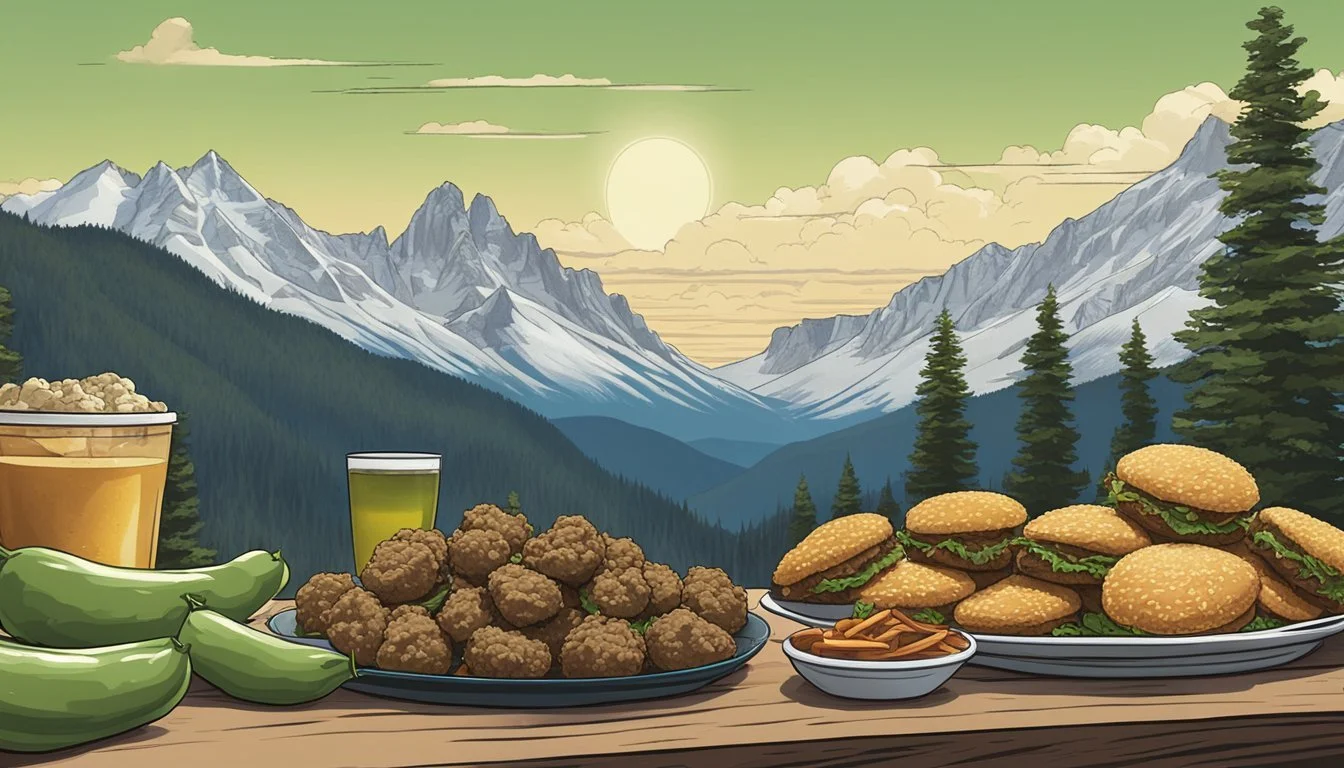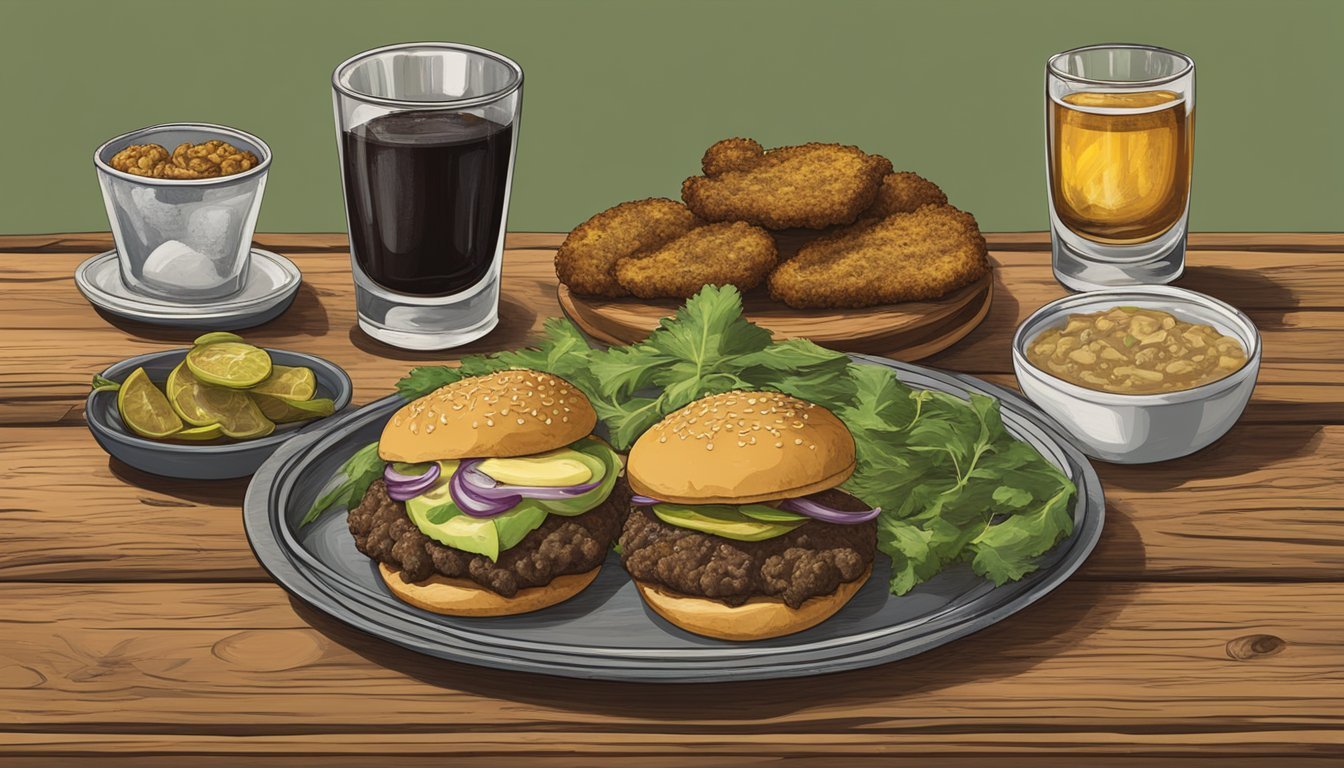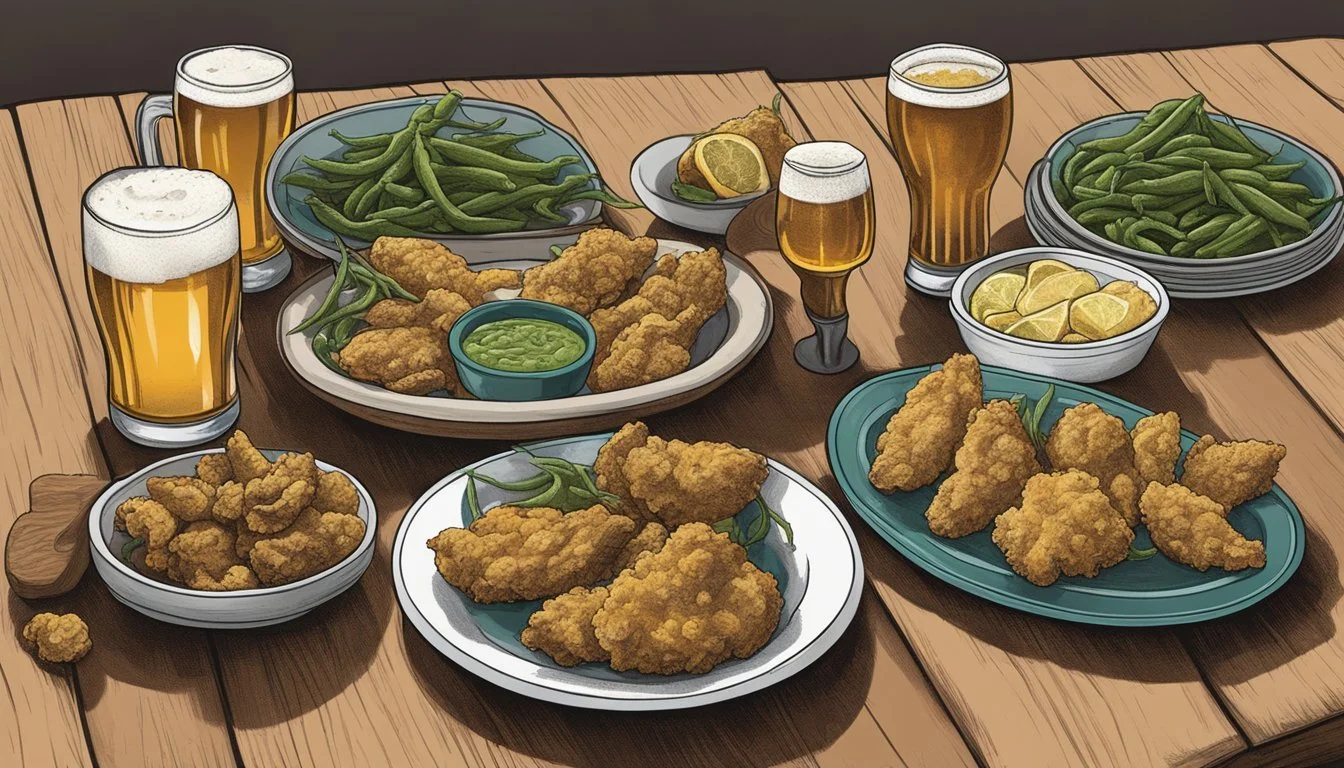What Food Is Colorado Known For?
A Guide to the State's Signature Dishes
Colorado's culinary landscape offers an eclectic mix of flavors that reflect the state’s geographical diversity and cultural heritage. With its thriving agricultural sector, Colorado is renowned for its high-quality produce and meats. The state's food scene is characterized by a fusion of traditional American fare with innovative touches, making Colorado cuisine a flavorful adventure for residents and visitors alike.
Among the most representative foods of the state is Colorado lamb, celebrated for its tender quality and rich flavor, a direct result of the free-range lifestyle of the sheep in the region. The state also takes pride in its uniquely flavorful Palisade peaches, which have gained recognition for their juiciness and taste. Moreover, Colorado's green chili has become a staple, often considered an informal symbol of the state's cuisine due to its widespread popularity and use in various dishes.
A culinary journey through Colorado would not be complete without experiencing the innovation found within its borders. The state's emphasis on locally sourced ingredients has resulted in a cuisine that is both grounded in its origins and bold in its expressions. This commitment to local produce ensures that Colorado's cuisine remains fresh, distinctive, and continually evolving.
Iconic Colorado Foods
Colorado's cuisine is characterized by unique and flavorful foods that highlight the state's diverse agricultural heritage and its high-altitude advantages. Below are some of the state's most renowned culinary offerings.
Rocky Mountain Oysters
Often considered a novelty, Rocky Mountain Oysters (What wine goes well with oysters?) are a local delicacy made from the testicles of bulls or calves. They are typically breaded and deep-fried, resulting in a dish that's both crisp and tender, challenging preconceptions with its surprisingly appealing taste.
Colorado Bison
The Colorado Bison (What wine goes well with bison?), or buffalo, has a deep connection to the state's identity and is often served as a buffalo burger. Bison meat is known for being leaner and more nutrient-rich than traditional beef. Restaurants throughout Colorado offer it as a tastier and healthier alternative to conventional red meats.
Colorado Lamb
Famed for its high quality, Colorado Lamb is sourced from animals that graze on the mountain pastures of the state. These pastures, enriched with a variety of grasses, herbs, and berries, give the lamb its distinctive, milder flavor and tender texture.
Palisade Peaches
The Palisade Peaches, named after the region on the Western Slope known for its peach orchards, are celebrated for their juicy and succulent taste. These peaches are typically harvested in late summer and are a sweet testament to Colorado's fruit-producing prowess.
Popular Dishes and How They Are Served
Colorado's culinary identity is shaped by a variety of unique dishes. From savory stews to innovative pizzas, (What wine goes well with pizza?) the following offerings are emblematic of the state's diverse flavors, prepared in ways that pay homage to both tradition and local tastes.
Green Chili Dishes
One cannot discuss Colorado's cuisine without mentioning green chili. This robust stew typically consists of pork cubes, roasted green chili peppers, onions, garlic, and potatoes. The ingredients are slowly simmered until the flavors meld into a dish with a distinctive smoky profile, often served over burritos, or as a standalone dish with warm flour tortillas.
Mountain Pies
While not a specific dish, Mountain Pies are a campfire tradition in Colorado. A mountain pie is usually composed of two slices of bread filled with various ingredients, such as meats, cheeses, or sweet fillings, and then toasted in a special iron over a campfire. These pies can range from being filled with something simple like ham and cheese to more complex flavors including pizza toppings or fruit fillings.
Trout Varieties
Colorado's rivers are abundant with trout, making it a staple on local menus. Trout is commonly prepared grilled, fried, or smoked which highlights its delicate flavor. Diners can find a variety of trout species, including rainbow trout, cutthroat trout, and brown trout. Each is often served with minimal seasoning and accompanied by fresh, seasonal sides.
Unique Colorado-Style Pizza
The Colorado-style pizza is a distinct culinary creation. Characterized by its thin, cracker-like crust and unorthodox toppings such as sauerkraut or spicy peppers, this pizza style is a nod to Colorado's innovative approach to traditional foods. It often incorporates elements of Southwestern cuisine, which adds a unique local twist to this global favorite.
Local Produce and Harvest
Colorado’s diverse climate and fertile soils foster an abundance of fresh produce, each item with its own peak harvest season. Notably, the state is renowned for Olathe Sweet Corn, Rocky Ford melons, and Pueblo Chiles—crops celebrated for their exceptional flavor and quality.
Olathe Sweet Corn
In the heart of Colorado’s farming country, Olathe Sweet Corn is revered for its sweetness and tender texture. Harvested in late summer, this corn variety is a result of cool evenings and warm days which contribute to its distinctive taste. Residents and visitors alike eagerly await its arrival at farmers markets and grocery stores.
Peak Season: Late July to Early September
Notable Qualities: Sweetness, tender kernels
Rocky Ford Produce
Rocky Ford, a region in Colorado, has become synonymous with cantaloupe (how long does cantaloupe last?) and watermelon. The Rocky Ford cantaloupe, particularly, is a sought-after variety known for its juicy flesh and sweetness. Protected by a unique geographical indication, this melon is carefully cultivated to ensure its quality and flavor.
Key Products: Cantaloupe, Watermelon
Harvest Time: Mid-July to October
Pueblo Chiles
Pueblo Chiles, hailing from the Pueblo region, are celebrated for their robust flavor profile. These chiles range from mild to extremely hot, providing versatility for culinary use. A staple in local cuisine, these peppers are often fire-roasted, imparting a smoky depth to dishes.
Varieties: From Mild to Extra Hot
Seasonality: August to October
Colorado's Beverages and Brews
Colorado is a state that takes pride in its distinguished craft beer culture and innovative cocktail offerings. With a substantial number of breweries and a penchant for creative concoctions, its beverage scene is a paramount aspect of its culinary identity.
Craft Beer Offerings
Colorado boasts a vibrant craft beer scene, with over 400 breweries scattered across the state. The region's focus on variety and quality makes it a hub for beer enthusiasts.
Notable Breweries: Each brewery offers a distinct selection of beers, with some like the legendary brewery in Golden being recognized internationally.
Beer Festivals: Events like the Great American Beer Festival showcase the multitude of craft beer options available, reinforcing Colorado's status as a leader in the beer industry.
Signature State Cocktails
While beer might be the beverage that gets the most attention, Colorado's cocktail scene is not to be underestimated. The state’s mixologists often incorporate local ingredients and spirits to create unique drinks that reflect Colorado's heritage and flavor profile.
Colorado Bulldog: This is a twist on the classic White Russian, featuring vodka, coffee liqueur, cream, and a splash of cola.
Palisade Fresca: An ode to Colorado's produce, this cocktail includes vodka, peach purée from Palisade peaches, a hint of lime juice, and a topping of sparkling water, embodying the state's fresh and crisp flavors.
Colorado's Culinary Traditions
Colorado's food scene mirrors its landscape: varied, rich, and inviting. With a blend of traditional and innovative food experiences, Colorado offers an array of unique and iconic dishes that reflect both its history and contemporary tastes.
Denver's Culinary Contributions
Denver, the capital city of Colorado, has a vibrant food scene that pays homage to both heritage and innovation. The Denver omelette, a savory blend of eggs, onions, green bell pepper, ham, and cheddar cheese, serves as a hearty and reliable breakfast staple. The city's creative culinary spirit is further exemplified by establishments such as the Buckhorn Exchange, Denver's oldest restaurant, famous for its range of game meats and historic Western ambiance.
Denver also takes pride in its green chile stew, a warming and spicy concoction often made with pork and roasted green chilies. This beloved dish can be savored in various eateries, including the legendary Beau Jo's pizza institution, where Colorado-style pizza is served with an abundance of toppings and a unique crust designed to be dipped in honey.
Festivals and Food Events
Food festivals and events in Southern Colorado particularly showcase the region's culinary riches. The Annual Festival in the heart of the San Juan Mountains celebrates the local flavors through live cooking demonstrations, tastings, and the gathering of food enthusiasts.
Southern Colorado is synonymous with the slopper, a hometown innovation consisting of an open-faced cheeseburger drenched in green chile sauce, traditionally enjoyed at Gray’s Coors Tavern, recognized as the birthplace of this messy delight.
In the realm of beverages, Colorado's beer culture is both deep-rooted and experimental, with the state hosting hundreds of microbreweries. Colorado beer is not just a beverage but a cornerstone of local identity, prompting numerous beer-centric events and highlighting the state’s contribution to the craft beer movement.
Dining Experience in Colorado
Colorado offers a dining experience that is rich with history and modern innovation. Visitors can expect to indulge in a range of foods from traditional steaks and bison burgers to unique offerings like elk dishes, all served within venues that span from historic landmarks to cutting-edge contemporary eateries.
Historic Restaurants
The Buckhorn Exchange Restaurant stands as a testament to Colorado's gastronomic history. Founded in 1893, it is renowned for being Denver's oldest restaurant and is famous for serving a variety of game meat, including juicy steaks and exotic meats like elk. This restaurant allows diners to taste a slice of the old West alongside Colorado's culinary traditions.
Modern Dining
The modern dining scene in Colorado boldly embraces both local and global culinary trends. Patrons can find contemporary restaurants that specialize in farm-to-table experiences, highlighting local produce and meats. Within this eclectic mix, one will discover innovative variations of Colorado staples, such as bison burgers, that blend traditional flavors with modern culinary techniques.
Understanding Colorado's Food Culture
In the Centennial State, food culture is an eclectic mix where one can taste the freshness of the farm and the unique fusion of culinary traditions. At the heart of this culture are the values of freshness and a rich blend of flavors.
Fusion of Flavors
Colorado's cuisine is a vibrant tapestry woven from various cultural influences. The state's dishes incorporate elements from Mexican, Native American, and even cowboy traditions, melding them together with a modern American flair. This fusion is best portrayed in dishes like the green chili, which pairs indigenous chili with contemporary ingredients and techniques, creating a unique Colorado culinary experience.
Farm-to-Table Philosophy
The farm-to-table movement thrives in Colorado, thanks to its vast grasslands and mountainous terrains, which provide an abundance of fresh, local ingredients. This is exemplified in the high-quality lamb, raised on a diet of wild grasses, herbs, and other natural forages, which contributes to its juicy, tender texture and rich flavors. Chefs across the state prioritize local produce, reflecting a commitment to freshness and sustainability. Ingredients like peaches, melons, and chile peppers are just a few of the staples found in Colorado dishes, each bringing a bit of the state's natural bounty to the table.
Navigating Colorado Dining
When visiting Colorado, diners can indulge in a distinctive culinary scene that offers a range of activities from exploring local restaurants to enjoying food-based attractions. This section provides guides for both.
Local Restaurant Guides
Local restaurant guides are indispensable for any food enthusiast seeking the authentic flavors of Colorado. Guides like OnlyInYourState provide curated listings that highlight restaurants serving quintessential Colorado dishes. Travelers can explore an array of dining options, from establishments specializing in Colorado lamb known for its tender texture, to bistros offering the famous Sugar Steak. Food lovers can ensure they're making informed choices, as these local guides often come with reviews and rankings. For convenience, affiliate links might be provided, which could lead to a website where one can make a reservation or view the menu. When using these links, it's customary for guides to note if they participate in an Amazon Associate program or similar, where they may earn from qualifying purchases.
Food-Based Tourist Attractions
Colorado's food scene isn't only about sitting down for a meal; it's also about experiencing food-based tourist attractions that are as educational as they are delicious. Many visitors flock to farms and ranches that offer tours where they can learn about how free-range lambs and other local produce are raised and contribute to the state's cuisine. Sampling these foods at the source not only provides a deeper understanding of why they are special but also supports the local communities. Additionally, some regions host food festivals, which can be a dynamic way for guests to taste a variety of dishes, meet chefs, and mingle with fellow food lovers. This immersion into Colorado's food culture makes for a delicious and memorable part of any trip.
Unique Food-Related Terms
Colorado's culinary lexicon includes a mix of historical food terms and locally-termed slang, reflecting its rich food heritage and contemporary dining trends. These terms often surprise visitors and become memorable highlights of the culinary experience in Colorado.
Colorado Food Slang
In Colorado, certain slang terms are widely recognized within the local dining scene. For example, Rocky Mountain oysters, also known as prairie oysters or cowboy caviar, are actually bison testicles that are deep-fried and served as an appetizer. This dish is particularly associated with the town of Severance, where it is celebrated and has become a symbol of the region's ranching heritage.
Another local term that one might encounter is the "open-faced cheeseburger," a unique take on the traditional cheeseburger that's served with toppings on a single bun half, highlighting the ingredients.
Historical Food Terms
Historically, Colorado has been home to niche terms that resonate with its past. "The Market," for instance, while a generic term elsewhere, implies a specific historical locale in Colorado known for its fresh, quality produce and goods, becoming synonymous with the state's farm-to-table movement and its reputation for fresh, wholesome food.
It's important for aficionados of historical culinary phrases to note how some terms have evolved or held their ground, serving as a bridge between the state’s historical roots and its current food culture.






